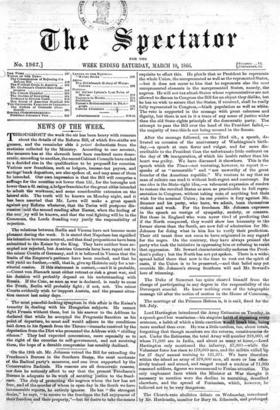After the message followed, on the 22nd ult., a speech,
de- livered on occasion of the anniversary of Washington's birth- day,—a speech at once fierce and vulgar, and far more dis- creditable to the President than the unfortunate little outburst on the day of lit inauguration, of which his health rather than his heart was guilty. We have discussed it elsewhere. This is the speech which the Times—not venturing, however, to report it— speaks of as "memorable " and " not unworthy of the great founder of the American republic." We venture to say that no man of culture can read it without both regret and contempt. Its one idea is the State-right idea,—a vehement expression of resolve to restore the revolted States as soon as practicable to full repre sentation in Congress, without taking note of anything but their- wish for the nominal Union ; its one passion is fury against Mr. Sumner and his party, who have, we admit, been themselves violent and weak. For the freedmen Mr. Johnson expresses in the speech no vestige of sympathy, anxiety, or concern. But those in England who were never tired of predicting that if the North conquered, they would show less humanity to the former slaves than the South, are now full of admiration for Mr. Johnson for doing what in him lies to verify their prediction. Their old taunt does not seem to have originated in any regard for the negro. On the contrary, they have always praised the party who took the initiative in oppressing him or refusing to resist that oppression. Mr. Seward characteristically endorses the Presi- dent's policy ; but the North has not yet spoken. There is a wide- spread belief there that now is the time to root out the spirit of caste,. if the Union is to be preserved,—and that belief may yet override Mr. Johnson's strong Southern will and Mr. Seward's love of trimming.






























